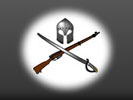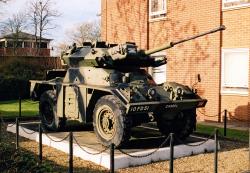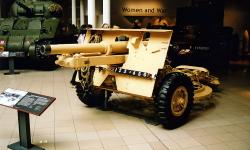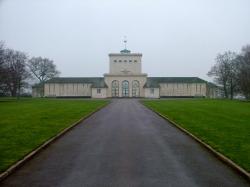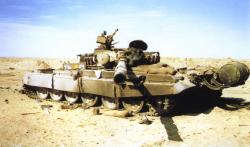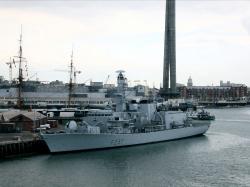Translate this Page
Jidballeh
Battle Name : Jidballeh
Date(s) : 10 January 1904
Part of : Operations against the "Mad Mullah" ,
Outcome : A victory for British and Imperial Forces over Somali Dervishes
Type of battle : Land
Summary
The 4th Expedition against the Mullah called for greater Forces. General Egerton succeeded Brigadier Manning who had led the 3rd Expedition. The 1st Bn Royal Hampshire Regt and two battalions of the Indian Army were added to the Force. The Royal Navy provided backup, patrolling the coastline and preventing the running of arms to support the dervishes. Two major engagements took place the first of which, at Jidballeh on 10th January 1904 involved the greatest number on both sides up to that time. It resulted in the disintegration of the Mullahs army but not to his capture or removal from the Protectorate. The second battle, a joint service engagement, took place at Illig on the East Coast of the Horn of Africa on the 21st April 1904
More details
To secure the escape route by the Mullah to the east the support of the Sultan of the Mijertain was secured, and a garrison was located at Galadi in the Haud to prevent his escape to the south.
In December 1903 Egerton concentrated his force at Wadamego. On 20th Dec Kenna with a mounted force made a recce to Badwein to assess the dervish strength . It was on this occasion the Lt Carter won his VC saving an Indian soldier under fire. The major dervish force was formed around Jidballeh and Egerton with Kenna and his mounted troops and Fasken’s Bde moved forward to Badwein and ordered Manning with his Bde to meet him on 9th January 20 miles E. of Badwein. The next morning, at 0500 hrs, the whole force less their water and heavy baggage set out for Jidballeh some fifteen miles distant. Within a mile from the well the mounted troops turned to the flanks and the two brigades formed square to receive an attack by about 6,000 – 8,000 dervish two hundred of whom were mounted. The dervish footmen had been trained in fire and movement by someone with experience from the recent South African War and advanced in rushes then taking cover to fire. The British force with the guns of the Mountain battery in front lay or knelt to receive the charge but the battery and the Maxim guns wrought havoc with the dervish who were not able to approach within a couple of hundred yards of the square . Twenty six minutes after the initial shots the battle was over and Kenna with his mounted troops was released to complete the rout. Unfortunately the lack cavalry with lance or saber precluded an overwhelming victory. During this battle Lt Smith D.C.L.I. earned his VC.
VC Awards
Lt Herbert Augustine Carter, Indian Staff Corps serving with the 6th Mounted Infantry & att K.A.R. He was 29 years old, and a Lieutenant in the Mounted infantry, Indian Army during the Fourth Somaliland Expedition when the following deed took place for which he was awarded the VC.
On 19 December 1903 during a reconnaissance at Jidballi, Somaliland (now Somalia), when two sections were retiring before a force of Dervishes who outnumbered them by thirty to one, Lieutenant Carter rode back alone, a distance of 400 yards, to the assistance of a private who had lost his horse and was closely pursued by a number of the enemy. The man was so badly wounded that it took three attempts to get him on to the horse.He was killed in action in Mwelo Mdogo, on 13 January 1916.
Lt Clement Leslie Smith 2nd Bn Duke of Cornwall’s Light Infantry was 25 years old, and attd. 5th Somaliland Light Infantry during the Fourth Somaliland Expedition when the following deed took place for which he was awarded the VC.
On 10 January 1904 at the commencement of the fight at Jidballi, Somaliland, Lieutenant Smith and a medical officer tried to rescue a hospital assistant who was wounded. The rapidity of the enemy's fire, however made this impossible and the hospital assistant was killed. Lieutenant Smith then did all that was possible to bring out the medical officer, helping him to mount a horse and, when this was shot, a mule. This also was shot and the medical officer was killed, but the lieutenant stayed with him to the end, trying to keep off the enemy with his revolver.
The Mullah was driven north into the Sol Haud his forces were scattered and he eventually sort refuge in the Mijertain Sultanate.
